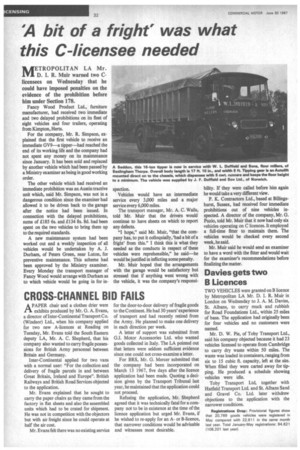CROSS-CHANNEL BID FAILS
Page 34

If you've noticed an error in this article please click here to report it so we can fix it.
PAPER chair and a clothes drier were exhibits produced by Mr. G. A. Evans, a director of Inter-Continental Transport Co. (Windsor) Ltd., when his company applied for two new A-licences at Reading on Tuesday, Mr. Evans told the South Eastern deputy LA, Mr. A. C. Shepherd, that his company also wanted to carry fragile possessions for British Army personnel between Britain and Germany.
Inter-Continental applied for two vans with a normal user: "For the collection and delivery of fragile parcels in and between Great Britain, Ireland and Europe". British Railways and British Road Services objected to the application.
Mr. Evans explained that he sought to carry the paper chairs as they came from the factory in flat sheets and also the assembled units which had to be crated for shipment. He was not in competition with the objectors but with air freight since he could operate at half the air cost.
Mr. Evans felt there was no existing service for the door-to-door delivery of fragile goods to the Continent. He had 30 years' experience of transport and had recently retired from the Army. He planned to make one delivery in each direction per week.
A letter of support was submitted from G.I. Motor Accessories Ltd. who wanted goods collected in Italy. The LA pointed out that letters were seldom sufficient evidence since one could not cross-examine a letter.
For BRS, Mr. G. Mercer submitted that the company had been incorporated on March 13 1967, five days after the licence application had been made. Quoting a decision given by the Transport Tribunal last year, he maintained that the application could not proceed.
Refusing the application, Mr. Shepherd agreed that it was technically fatal for a company not to be in existence at the time of the licence application but urged Mr. Evans, if he wished to re-apply for an Aor B-licence, that narrower conditions would be advisable and witnesses most desirable.
























































































































